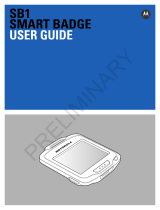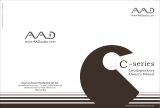Page is loading ...

SB1
Bookshelf Loudspeaker
User’s Manual
Model

Room furnishings also play an important role. Soft
furnishings (sofas, carpets and curtains) absorb
midrange and high frequencies, potentially dulling the
sound, while hard surfaces and emptier rooms brighten it.
Experimenting with the effects of different placements in
your own listening/viewing room is the key to finding the
sound you like best.
Placement Tips
Ideally, you'll usually get the best sound when your
speakers are:
• 1.5 times as far away from you as from each other
• L and R speakers are equidistant from the listener
• both at the same height (tweeters close to ear level)
Note: the SB1 is not designed to be oriented on it’s side.
Once you've placed them, finish by moving them around
so that they're:
• Near the front edge of shelves and cabinets
• Greater than 1 foot from back walls, 2½ feet from side
walls, if on stands
• Pointing inward a bit toward your ears
Taking these steps -- all shown in Figure 1 -- will give you
the smoothest response, and put you right in the center
of the stereo image at its most well-defined point.
For five-channel music and home theater systems, use
the same basic setup -- all shown in Figure 2 -- and when
possible, set up the system so that:
• The center speaker is right above or below the TV
• The rear speakers are in an equilateral triangle with the
listening position, the speakers at least 5 feet apart
• The rear speakers are at the same height or slightly
higher than the fronts
Thank you for your purchase of the NHT SB1
Super Bookshelf loudspeaker.
Like all NHT loudspeakers, the SB1's development has
been guided by the study of human hearing, its design
rigorously tested, and its components optimized to
deliver clean, clear musical sound.
Since the quality of your speakers is one of the most
important factors in maximizing the sound you'll get from
your music and home theater system, we're sure that
you'll find your purchase of the SB1 a good investment,
and invite your comments.
If you find your experience with SB1 speakers as
satisfying as we believe you will, and wish to expand into
a larger surround system, you'll find specifications for
their sonically matched companions, the SC1 center
channel and SW10 subwoofer, on the back of this
manual.
Background
The Model SB1, a new generation of speaker based on
NHT's critically acclaimed SuperZero, offers not only the
detailed midrange clarity for which its predecessor was
known, but incorporates significant performance
improvements, as well. Its acoustic suspension design
offers deeper bass response, which is better suited to
digital surround audio, and its proprietary neodymium
magnet tweeter can be placed far closer to the woofer,
improving sonic coherence and overall frequency
response. Attached to the rear of the tweeter is a
massive heat sink, which both improves power handling
and strengthens the cabinet to minimize resonance. The
result of these design enhancements is a compact
system that reproduces recorded music with superb
frequency response and remarkable accuracy.
Please take a few minutes to read through this owner's
manual before setting up your speakers; this information
will help you get the most out of them. Also, please keep
the SB1's packaging to use in case you move or
transport them.
If you have questions at any time during setup or use,
feel free to call your NHT dealer or our Toll-Free
Customer Hotline at 1-800-NHT-9993.
Placement
The SB1's compact size of allows them to be used in
virtually any (indoor only) placement: on shelves, on
cabinets, on speaker stands, or mounted on walls (see
Placement Accessories).
Please remember that small changes in speaker position
can have a significant effect on sound: moving speakers
nearer to walls or corners will increase bass output, but
also may add "boom." Placing them farther away tends
to decrease bass output, but can improve imaging.
Fig. 1

In many situations, it won't be possible to place the rear
speakers in their ideal positions. If this is the case in
your room, try to place the rear speakers equidistant
from the center of the main seating area. If you must
place the rear speakers close to the main seating area,
position them so that they are above the ear height of the
tallest listener, and toe them in so that imaginary lines
coming from the center of each speaker cross in front of
the main seating area. You can add time delay to the
rear channels with your surround sound processor to
make the rear speakers seem farther from the seating
area than your room setup will allow.
Placement Accessories
Sometimes, current furniture and where it's placed won't
allow the speaker placement you prefer. Two quick ways
around this are to use speaker stands, or to mount them
on walls.
NHT offers a stand - the Last Stand - specifically
matched for the SB1, available through your NHT Dealer.
The SB1 has threaded inserts for wall mounting. You
may use the Omnimount Systems model RST 25. For
more information visit the Omnimount Systems web site
at www.omnimount.com or call them at 1-800-668-6848.
Connections
Before connecting your SB1 loudspeakers to your
system, turn off the power to your amplifier / receiver to
avoid damaging the components or the speakers.
First, take a look at the five-way binding posts on the
back of your speakers. They'll accept raw wire, banana
plugs or spade plugs. Note that posts should be
tightened by hand, since pliers can strip or break them.
Next, choose your speaker wires. Like all wires,
speaker wires are rated by a gauge number. The guage
number gets smaller as the wire gets thicker. Thicker
wire is preferable; we recommend 16-guage for shorter
runs, and 12-guage for runs longer than ten feet (your
authorized NHT dealer can help with wire). Equal lengths
of wire for all speakers is ideal, but not absolutely
necessary.
Prepare the wires by stripping 1/4" to 3/8" of insulation
from the ends and, if the wire is stranded rather than
solid, tightly twisting the exposed wire strands.
Finally, connect your speakers to your amplifier or
receiver, connecting all conductors "in-phase;" that is,
the same half of the wire-pair to the positive / red
amplifier terminal and the positive /red speaker terminal.
Similarly, connect black outputs and inputs. If you have
trouble following which wire half is which, look closely,
and you'll see that your speaker wires have some sort of
marking -- lettering, ridges, or color difference - to help.
Before powering up your amplifier or receiver, separate
different kinds of cables to minimize noise. Keep
speaker wires at the maximum practical distance from
line-level, digital, and power cables, and if they must
cross, keep them at right angles.
Operation
The NHT SB1's are compatible with virtually all quality
amplifiers, and are designed to handle a wide range of
listening levels.
Every speaker, however, has limits, and it's important to
listen for them. Speaker damage most often results not
from brief loud musical peaks, but from sustained high
volume levels in some or all frequencies. For this reason,
extreme volume settings and excessive bass, treble or
equalizer boosts are not recommended.
If you hear unusual distortion or breakup, or notice heat
coming from either your woofer or tweeter, decrease
volume immediately, neutralize any excess bass, treble
or equalizer boosts, and avoid setting any controls to
similar extremes again.
Maintenance
Your speakers require no or minimal maintenance under
normal use, as long as you avoid exposing them to direct
sunlight, high temperatures, or moisture. Clean
cabinets, when necessary, using a damp cloth or a mild,
non-abrasive cleaner; to clean grilles, remove from
speaker and use a soft brush or a vacuum on its lowest
setting. Do not attempt to clean the actual drivers.
Satisfaction
Your satisfaction with your new NHT SB1 loudspeakers
is important to us. Please note the matched products
and accessories we provide for them, and your warranty,
printed on the back of this manual. And again, if you
have any questions regarding your speakers' use, feel
free to call NHT at 1-800-NHT-9993. Enjoy your listen-
ing and viewing!
Fig. 2
REV 6-02

SB1
SC1
SW10
Specifications
System Type
Driver Complement
Tweeter-
Woofer-
Video Shielded Unless Noted
Response
Sensitivity
Impedance
Recommended
Amplifier Power
Weight
Dimensions
Finish
2-Way Acoustic Suspension
1” fluid cooled aluminum dome tweeter
with neodymium magnet structure
1” fluid cooled aluminum dome tweeter
with neodymium magnet structure
5.25”
Polypropylene
Minimum
15 watts
Maximum
125 watts
Minimum
15 watts
Maximum
150 watts
68Hz - 22kHz
+/- 3dB
86dB / 2.83v
86dB / 2.83v
78Hz - 22kHz
+/- 3dB
8 ohm nominal
8 ohm nominal
6.75 x 6.25 x 10.25
8 lbs.
11 lbs.
43 lbs.
6.63 x 16.54 x 5.63
14.5 x 14.5 x 14.5
White or Black - High Gloss Piano Finish
Black - High Gloss Piano Finish
Black - High Gloss Piano Finish
(2) 4.5”
Polypropylene
10”
Polypropylene
(Not Video Shielded)
2-Way Acoustic
Suspension
Vented
Powered - 150 watts
Length” x Width” x Height”
Super Series
Limited Warranty
Valid Only in the U.S.A.
Warranty Period
For a period of 5 years for parts and 5 years for labor (1 year parts and 90 days labor for electronics) from the date this product is first purchased from an author-
ized NHT dealer, Now Hear This (NHT) warrants that if it fails to function properly due to a manufacturing defect, despite its being installed and operated accord-
ing to these instructions and used under normal conditions, it will be either replaced or repaired with new or rebuilt parts (both at NHT's option) with a unit of
comparable value without charge to you.
What's Not Covered
Altered, defaced or removed serial numbers void this warranty.
This warranty does not cover any product used in trade, business, industrial or commercial applications.
This warranty also does not cover the cabinet or appearance factors, or costs, defects or damage resulting from misuse, abuse, accident, improper mainte-
nance, alterations or modifications not authorized in writing by NHT, or parts or labor from any source other than an authorized NHT service location.
Damage due to power exposure in excess of the speaker's published power ratings; ie, overpowering, lightning or power surges, are also not covered.
Your Rights
This warranty gives you specific legal rights, and you may have other rights which vary from state to state.
NHT limits this warranty to the purchase price of the product, excludes incidental or consequential damages, and limits its obligations under any implied war-
ranties under state laws to a period not exceeding their warranty periods. As some states do not allow the above limitations, however, they may not apply to
you.
To Obtain Service
NHT has appointed a number of authorized service companies throughout the USA who can provide warranty service upon your presenting your sales receipt
showing place and date of original owner's transaction.
To find the name and address of the nearest authorized NHT service location, call or write:
AB Tech Services, 17C Airport Drive, Hopedale, MA 01747. 1-800-225-9847
For your future convenience, please keep this warranty with your sales receipt, and record date and place of purchase for further reference.
All Super Series products are sonically matched for seamless integration into multichannel systems.
(each)
31Hz - 180Hz
+/- 3dB
/











